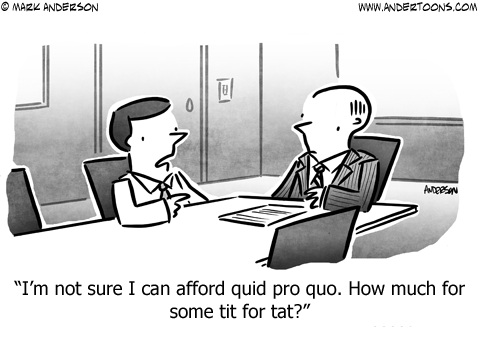Slang dictionary
quid pro quo
[kwid pro kwoh]
What does quid pro quo mean?
Tit for tat. You scratch my back, I’ll scratch yours. Or, if you want to get a little fancier, quid pro quo.
This is a Latin-derived expression referring to something done for someone in exchange for something of equal value in return.
Related words:
- one good turn deserves another
- pay for play
- QPQ
- reciprocity
- trade-off
- win-win
Where does quid pro quo come from?

In Latin, quid pro quo literally means “something for something” or “one thing for another.”
The expression was notably used in the Middle Ages by apothecaries who were figuring out what substances may be substituted for another (quid pro quo) in medicines. The phrase was added to a 1535 English translation of Dutch humanist Erasmus, who apparently questioned the questionable quid-pro-quoing of these quacks.

imgur
By the late 1500s, quid pro quo spread from medicine into general contexts for a “tit for tat.” A 17th century history on the reign of King Charles, for instance, described Christianity as a quid pro quo in that people must repent for redemption.

Quid pro quo especially made its way into legal, political, and commerical texts by the 19th century, a useful shorthand for all sorts of reciprocal exchanges.
Since the late 20th century in labor law, quid pro quo is widely used as a name for a type of workplace sexual harassment in which an employer holds an employee’s job hostage in return for sexual favors.
The Weinsteins and their company “repeatedly and persistently treated female employees less well than male-employees through gender-based hostile workplace harassment, quid pro quo harassment, and discrimination” https://t.co/FvjDMhUT91
— Variety (@Variety) February 11, 2018
Examples of quid pro quo
Who uses quid pro quo?
Quid pro quo can be used as noun (e.g., we have a quid pro quo with our landlord) or as a modifier (e.g., we have a quid pro quo deal with our client). Either way, the phrase is used in everyday speech and writing generally to mean “trade,” “exchange,” or “agreement.”

In business contexts, quid pro quo can have a positive or neutral connotation, characterizing a fair contract involving the exchange of goods or services for compensation.
In political contexts, however, quid pro quo reeks of corruption, where quid pro quo arrangements with lobbyists suggests bribery or “pay for play.”
Note
This is not meant to be a formal definition of quid pro quo like most terms we define on Dictionary.com, but is rather an informal word summary that hopefully touches upon the key aspects of the meaning and usage of quid pro quo that will help our users expand their word mastery.